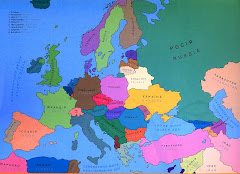
Ukraine is having a cold spell. It's been about -25 degrees in Starobilsk for several days. I've managed to stay pretty warm in my winter clothes, layered up and bundled up like an Eskimo. It's cozy inside Luba's house. I feel lucky, because plenty of PCVs live where heat is limited and reliance on heaters is risky.
When it gets this cold for so long, though, you feel it. The paths and streets are sheer ice. Your fingers and toes start to chill, then cheeks, nose, face. I pull my hat down over my ears, and tighten my hood to ward off the wind. I pull my wool scarf, a great present from my St. Petersburg friend Pat, over my nose and up to my eyes. I am transported to a fiercely cold winter in Madison, Wisconsin, where -30 and -40 temperatures hovered for weeks at a time, and overly-dedicated graduate students, myself among them, actually held long conversations on Bascom Hill about the new books on slavery, while getting frost bite in any exposed area.
Yesterday I had to do errands. I met PCVs Mike Young and Natalie to get my train tickets to Kiev, which they had kindly bought for me, sparing me the hassle of getting tickets with my lousy Russian. I'm going to Chernigov via Kiev for a Russian language refresher tomorrow, obviously much needed. I went to the post office to mail my daughter Elissa a birthday card; her birthday is 19 February and I hope the card gets there before I arrive in mid-March! I stopped at the pharmacy for tylanol and claritan, then at the store for milk and cookies. By the time I got home, I was freezing. I need a better pair of gloves, I've decided, smart wool like my socks.
Today I went to the English Club. Seven brave souls joined me. And yes, they were brave. This is how cold it was: The bazaar was closed today. The bazaar! The bazaar NEVER closes. Too cold for Ukrainians? Well then, I don't feel so bad, a Floridian, complaining about this cold spell
When it gets this cold for so long, though, you feel it. The paths and streets are sheer ice. Your fingers and toes start to chill, then cheeks, nose, face. I pull my hat down over my ears, and tighten my hood to ward off the wind. I pull my wool scarf, a great present from my St. Petersburg friend Pat, over my nose and up to my eyes. I am transported to a fiercely cold winter in Madison, Wisconsin, where -30 and -40 temperatures hovered for weeks at a time, and overly-dedicated graduate students, myself among them, actually held long conversations on Bascom Hill about the new books on slavery, while getting frost bite in any exposed area.
Yesterday I had to do errands. I met PCVs Mike Young and Natalie to get my train tickets to Kiev, which they had kindly bought for me, sparing me the hassle of getting tickets with my lousy Russian. I'm going to Chernigov via Kiev for a Russian language refresher tomorrow, obviously much needed. I went to the post office to mail my daughter Elissa a birthday card; her birthday is 19 February and I hope the card gets there before I arrive in mid-March! I stopped at the pharmacy for tylanol and claritan, then at the store for milk and cookies. By the time I got home, I was freezing. I need a better pair of gloves, I've decided, smart wool like my socks.
Today I went to the English Club. Seven brave souls joined me. And yes, they were brave. This is how cold it was: The bazaar was closed today. The bazaar! The bazaar NEVER closes. Too cold for Ukrainians? Well then, I don't feel so bad, a Floridian, complaining about this cold spell
















































